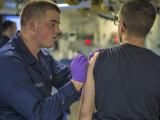Nov 13, 2003 (CIDRAP News) Recent figures from the US Department of Defense (DoD) indicate a higher rate of myopericarditis (heart inflammation) cases among military personnel following smallpox vaccination than previously reported, though the complication remains relatively rare.
The latest safety summary on the military vaccination program says that 58 cases of myopericarditis occurred among 506,007 military personnel who were vaccinated between December 2002 and Oct 22.
Seventy-one percent of those vaccinated, or about 359,265, were first-time vaccinees, and 55 of the 58 myopericarditis cases occurred in that group, according to the safety report and DoD officials. That indicates a rate of 1 case in about 6,532 primary vaccinees.
In a previous report, published last June in the Journal of the American Medical Association, DoD medical officials reported 18 cases among 230,734 primary vaccinees in the first 4 months of the vaccination program, for a rate of 1 case in 12,819 primary vaccinees. That represents slightly more than half the rate indicated by the more recent figures. (The rate of 1 in 12,819 was 3.6 times higher than the expected rate for unvaccinated military personnel, according to the JAMA report.)
Other DoD figures also indicate an increase in the frequency of cases. A previous safety summary covering vaccinations from December through mid-May showed an overall rate of 27 cases among about 430,000 vaccinees, or 1 in 15,026 vaccinees. The latest overall numbers58 cases in 506,007 vaccineesindicate a rate of 1 case in 8,724 vaccinees.
Jim Turner, a DoD Press Office spokesman in the Pentagon, said the apparent increase in the case rate is probably a result of delayed reporting of cases. "As expected, media reports of myo-pericarditis after smallpox vaccination led to additional reports to DoD's surveillance system," he told CIDRAP News by e-mail. "Enhanced reporting appears to be the principal contributor of the apparent rate increase."
All the myopericarditis patients recovered, according to DoD officials. Turner said all but three of the 58 patients were hospitalized, but noted that military hospitals have a "low threshold for admission" because financial considerations are different than in civilian healthcare. "Sometimes, service members are admitted for observation or because there is no supervision of them in the barracks when their colleagues are out training," he said.
The average time in the hospital for 29 of the myocarditis patients was 3 nights (median, 2 nights), Turner reported. Data were not available for the other patients.
Heart problems in civilian vaccinees
In related news, researchers reported this week that myocarditis and pericarditis occurred at a rate of 58 cases per 100,000 vaccinees in the civilian smallpox vaccination program. Researchers from the Centers for Disease Control and Prevention (CDC) and two universities presented the report at the American Heart Association (AHA) Scientific Sessions in Orlando.
Fifteen cases of myocarditis and six cases of pericarditis were identified among 36,217 vaccinees in the civilian program from Jan 24 through May 9 of this year, according to an abstract of the report by the CDC's Richard Schieber and others. The numbers indicate a rate of 1 case in about 1,724 vaccinees. Civilian vaccinees are mostly healthcare workers and are considerably older than those immunized in the military; the median age for the case-patients was 48 years.
Most of the civilian cases were mild and none of the patients died, but 11 were hospitalized, according to Schieber's report. The median time from vaccination to the onset of symptoms was 12 days.
Schieber and colleagues reported nine cases of "acute coronary syndrome," such as myocardial infarction or angina, occurring within about 3 weeks after vaccination in the 36,217 civilian vaccinees. These included two women in their 50s who died of myocardial infarction, as was widely reported last March. Those cases prompted the CDC to warn against smallpox vaccination for anyone with known heart disease or more than three major heart disease risk factors. However, as the CDC has said previously, the number of cases was too low to suggest a significant probability that the vaccinations contributed to them.
The report by Schieber and colleagues concludes, "Smallpox vaccine appears to be associated with myocarditis and pericarditis, but so far, disease has been mild among civilian vaccinees. The relationship between smallpox vaccination and myocardial ischemia remains unclear."
Myopericarditis case report
In another report at the AHA meeting, specialists from the Mayo Clinic in Rochester, Minn., described what they believe is "the first case of biopsy-proven, smallpox vaccine induced myopericarditis," according to the abstract. The patient was a 29-year-old military reservist who, 2 weeks after vaccination, sought care for symptoms that included dyspnea. Tests showed systolic dysfunction and damage to heart muscle cells (myocyte necrosis), according to the report by Gregory K. Bruce and colleagues.
Polymerase chain reaction indicated no vaccinia virus in the myocardial tissue, and the researchers concluded that the case was "an aberrant immune reaction to the smallpox vaccination." The patient's condition improved rapidly when he was treated with high-dose corticosteroids. The authors note that such immunosuppressive treatment can be used only after negative tests for vaccinia in myocardial tissue.
"This case is important because it represents a potentially lethal complication of a rare disease which will be seen with increasing frequency as the US government continues its smallpox vaccination program," the researchers state in their abstract.
See also:
DoD smallpox vaccine safety summary
http://www.smallpox.army.mil/event/SPSafetySum.asp
June 25 JAMA report on myocarditis cases in military vaccinees
http://jama.ama-assn.org/cgi/content/full/289/24/3283



















